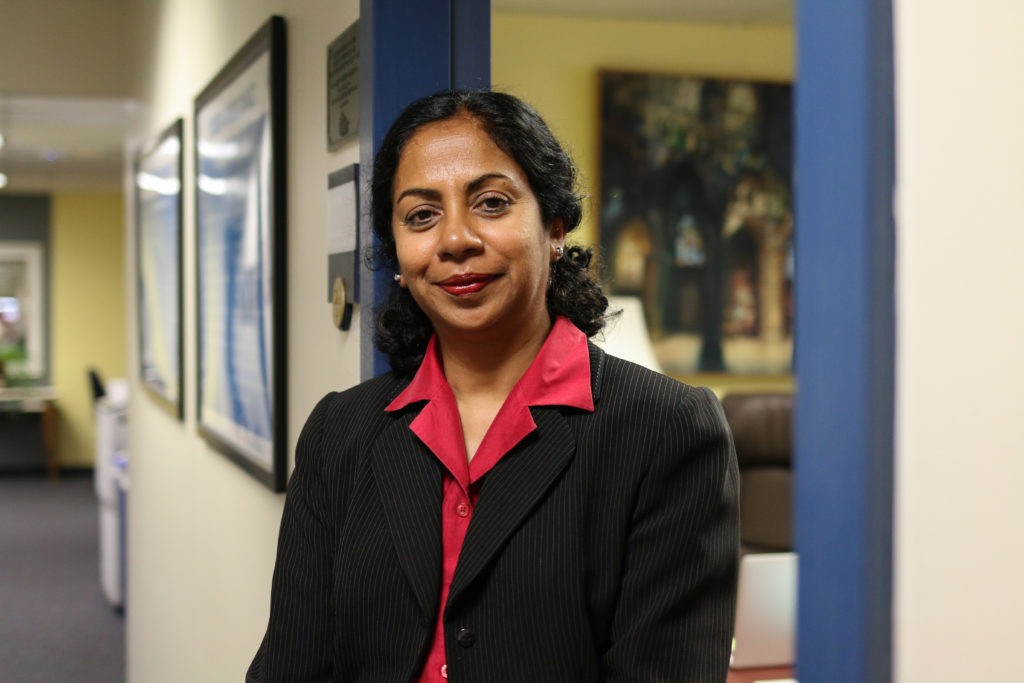The head of academics and special programs on the Mount Vernon Campus has implemented new cultural celebrations and established a student advisory committee during her first year in the role.
Elizabeth Chacko’s inaugural year as associate provost for the Mount Vernon academic experience and special programs coincided with the debut of two new living and learning communities – groups of students focused on a common topic like sustainability who reside together on the Vern. Chacko said in the past year, she has worked with faculty and students to introduce cultural celebrations like Lunar New Year and new programming for Vern residents.
Before starting in the position, Chacko said she would focus on building community among students in LLCs and the honors program by holding events that would be “accessible to all.” After holding the position for one semester, she said she had established an advisory committee of student representatives to receive feedback and develop improvements for the LLCs.
Chacko said faculty and students have enjoyed their involvement in the LLCs and the smaller class sizes in the programs, which have allowed students to bond with one another. She said she is working with faculty on developing new field trips for students enrolled in LLC-affiliated classes that are more relevant to the courses’ content.
“Overall, students were very positive about the program and appreciated the sense of community that was built in the living and learning communities,” she said in an email.
In light of the recent COVID-19 outbreak, Chacko said students are encouraged to keep in touch with each other and faculty, but professors are not requiring students to participate in any additional LLC-related activities outside of their classes.
She said faculty in the LLCs have adapted their courses for the instructional continuity period, and students in the program will participate in virtual Inside GW sessions this month over WebEx to speak with and answer questions from incoming students who have been admitted to the LLCs.
Chacko said officials will not launch any new LLCs next academic year.
Students in the two newest LLCs, those focused on sustainability and global connections, said they enjoyed the time they spent living in the LLCs but wished there were more ways for them to stay connected to faculty and community members after their one in the program.
Elizabeth Johnson, a freshman in the sustainability LLC majoring in history and political science, said the academic and community aspects of the program were “strong” given that the students in the community have remained in close contact through social media following the COVID-19 outbreak despite no longer living together.
“It was really nice to be in a community of people who share the same interests and academic goals,” she said.
Johnson, who is also a member of one of the student advisory committees Chacko set up to gather input from students about potential community-building events, said students on the committee served as spokespeople for LLC students and have relayed ideas for new events and guest speakers they would like to see.
She said Chacko was very “open” to suggestions, even from students who are not members of an LLC.
“Honestly, you could email her any time, and she would definitely set something up,” she said.
Johnson said Chacko gave students in the LLCs opportunities to be involved in helping coordinate and plan the logistics for Vern events like movie screenings and allowed students to provide their input on the events they would like to attend.
“She definitely wants the students to help put this program together based on what we want,” she said.
Carla Dell, a freshman in the Global Connections LLC majoring in international affairs, said she had a “positive experience” being a part of the program and bonding with students in relatively small classes. Dell said she was initially interested in being involved in one of the Vern’s LLCs because of the prospect of a tight-knit community at a large school.
Dell said the COVID-19 pandemic canceled some LLC events, like a dinner, but her residence hall’s group chats remain active. She added that the program has led to many “friendships and memories” but would have a greater impact on students if they could stay in the community beyond a single year.
“I feel like it shouldn’t just be some first-year community,” she said. “There should be some type of impact or something that then happens in future years to be able to come back and mentor incoming freshmen or some type of events working on research projects that would continue for all four years.”
Some of her LLC’s residents plan to live together in a District House affinity next year, she said.
Karina Ochoa, a freshman in the sustainability LLC majoring in political science and philosophy, said she has benefited from being part of the community.
But Ochoa said she wished the faculty teaching the sustainability community’s courses were able to stick with the LLC for longer than two years to plan improvements to the community, adding that the two-year tenure hindered its progress.
“Since we’re going to be cycling through faculty every two years, for the program there’s no specific direction for growth or a long-term plan,” she said. “There’s no long-term plan for the program since there’s going to be new people running it every two years.”








